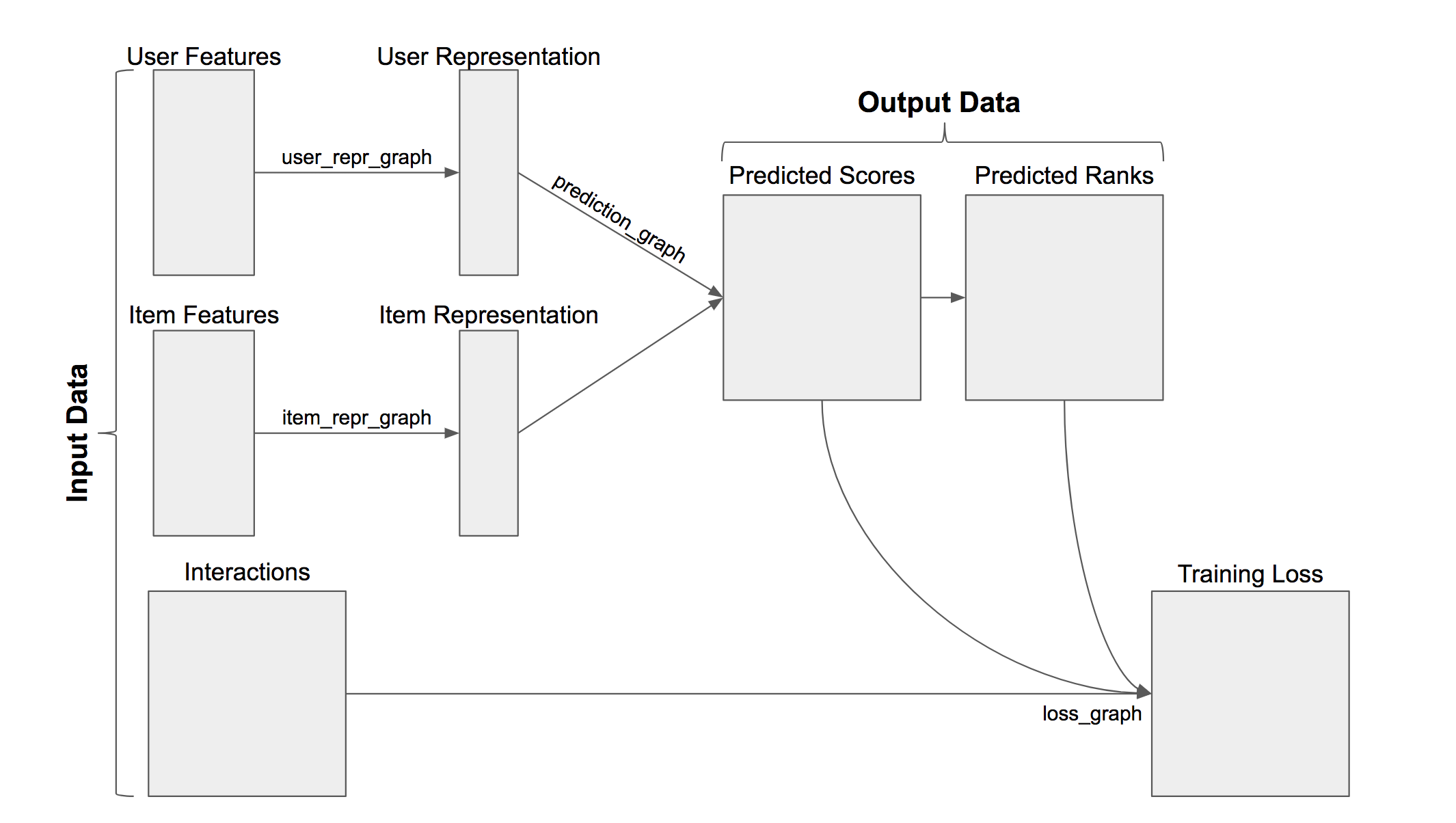When I run the code in check_movielens_losses.py or any other example application, I see the same error message--see the stack trace below:
Python 3.6.4 |Anaconda, Inc.| (default, Jan 16 2018, 10:22:32) [MSC v.1900 64 bit (AMD64)]
Type "copyright", "credits" or "license" for more information.
IPython 6.2.1 -- An enhanced Interactive Python.
runfile('C:/temp/RecommenderSystems/tensorrec-master/examples/check_movielens_losses.py', wdir='C:/temp/RecommenderSystems/tensorrec-master/examples')
C:\ProgramData\Anaconda3\lib\site-packages\h5py\__init__.py:36: FutureWarning: Conversion of the second argument of issubdtype from `float` to `np.floating` is deprecated. In future, it will be treated as `np.float64 == np.dtype(float).type`.
from ._conv import register_converters as _register_converters
C:\ProgramData\Anaconda3\lib\site-packages\lightfm\_lightfm_fast.py:9: UserWarning: LightFM was compiled without OpenMP support. Only a single thread will be used.
warnings.warn('LightFM was compiled without OpenMP support. '
INFO:root:Processing interaction and feature data
C:\ProgramData\Anaconda3\lib\site-packages\tensorflow\python\ops\gradients_impl.py:100: UserWarning: Converting sparse IndexedSlices to a dense Tensor of unknown shape. This may consume a large amount of memory.
"Converting sparse IndexedSlices to a dense Tensor of unknown shape. "
INFO:root:Beginning fitting
Traceback (most recent call last):
File "<ipython-input-1-c519eabf3859>", line 1, in <module>
runfile('C:/temp/RecommenderSystems/tensorrec-master/examples/check_movielens_losses.py', wdir='C:/temp/RecommenderSystems/tensorrec-master/examples')
File "C:\ProgramData\Anaconda3\lib\site-packages\spyder\utils\site\sitecustomize.py", line 705, in runfile
execfile(filename, namespace)
File "C:\ProgramData\Anaconda3\lib\site-packages\spyder\utils\site\sitecustomize.py", line 102, in execfile
exec(compile(f.read(), filename, 'exec'), namespace)
File "C:/temp/RecommenderSystems/tensorrec-master/examples/check_movielens_losses.py", line 93, in <module>
fit_kwargs)
File "C:\ProgramData\Anaconda3\lib\site-packages\tensorrec\eval.py", line 155, in fit_and_eval
interactions=train_interactions, **fit_kwargs)
File "C:\ProgramData\Anaconda3\lib\site-packages\tensorrec\tensorrec.py", line 539, in fit
n_sampled_items=n_sampled_items)
File "C:\ProgramData\Anaconda3\lib\site-packages\tensorrec\tensorrec.py", line 629, in fit_partial
feed_dict=feed_dict
File "C:\ProgramData\Anaconda3\lib\site-packages\tensorflow\python\client\session.py", line 905, in run
run_metadata_ptr)
File "C:\ProgramData\Anaconda3\lib\site-packages\tensorflow\python\client\session.py", line 1140, in _run
feed_dict_tensor, options, run_metadata)
File "C:\ProgramData\Anaconda3\lib\site-packages\tensorflow\python\client\session.py", line 1321, in _do_run
run_metadata)
File "C:\ProgramData\Anaconda3\lib\site-packages\tensorflow\python\client\session.py", line 1340, in _do_call
raise type(e)(node_def, op, message)
InvalidArgumentError: 0-th value returned by pyfunc_0 is int32, but expects int64
[[Node: PyFunc = PyFunc[Tin=[DT_INT64, DT_INT64, DT_INT64], Tout=[DT_INT64], token="pyfunc_0", _device="/job:localhost/replica:0/task:0/device:CPU:0"](IteratorGetNext_3:3, IteratorGetNext_2:3, _arg_Placeholder_0_0)]]
Caused by op 'PyFunc', defined at:
File "C:\ProgramData\Anaconda3\lib\site-packages\spyder\utils\ipython\start_kernel.py", line 268, in <module>
main()
File "C:\ProgramData\Anaconda3\lib\site-packages\spyder\utils\ipython\start_kernel.py", line 264, in main
kernel.start()
File "C:\ProgramData\Anaconda3\lib\site-packages\ipykernel\kernelapp.py", line 478, in start
self.io_loop.start()
File "C:\ProgramData\Anaconda3\lib\site-packages\zmq\eventloop\ioloop.py", line 177, in start
super(ZMQIOLoop, self).start()
File "C:\ProgramData\Anaconda3\lib\site-packages\tornado\ioloop.py", line 888, in start
handler_func(fd_obj, events)
File "C:\ProgramData\Anaconda3\lib\site-packages\tornado\stack_context.py", line 277, in null_wrapper
return fn(*args, **kwargs)
File "C:\ProgramData\Anaconda3\lib\site-packages\zmq\eventloop\zmqstream.py", line 440, in _handle_events
self._handle_recv()
File "C:\ProgramData\Anaconda3\lib\site-packages\zmq\eventloop\zmqstream.py", line 472, in _handle_recv
self._run_callback(callback, msg)
File "C:\ProgramData\Anaconda3\lib\site-packages\zmq\eventloop\zmqstream.py", line 414, in _run_callback
callback(*args, **kwargs)
File "C:\ProgramData\Anaconda3\lib\site-packages\tornado\stack_context.py", line 277, in null_wrapper
return fn(*args, **kwargs)
File "C:\ProgramData\Anaconda3\lib\site-packages\ipykernel\kernelbase.py", line 283, in dispatcher
return self.dispatch_shell(stream, msg)
File "C:\ProgramData\Anaconda3\lib\site-packages\ipykernel\kernelbase.py", line 233, in dispatch_shell
handler(stream, idents, msg)
File "C:\ProgramData\Anaconda3\lib\site-packages\ipykernel\kernelbase.py", line 399, in execute_request
user_expressions, allow_stdin)
File "C:\ProgramData\Anaconda3\lib\site-packages\ipykernel\ipkernel.py", line 208, in do_execute
res = shell.run_cell(code, store_history=store_history, silent=silent)
File "C:\ProgramData\Anaconda3\lib\site-packages\ipykernel\zmqshell.py", line 537, in run_cell
return super(ZMQInteractiveShell, self).run_cell(*args, **kwargs)
File "C:\ProgramData\Anaconda3\lib\site-packages\IPython\core\interactiveshell.py", line 2728, in run_cell
interactivity=interactivity, compiler=compiler, result=result)
File "C:\ProgramData\Anaconda3\lib\site-packages\IPython\core\interactiveshell.py", line 2856, in run_ast_nodes
if self.run_code(code, result):
File "C:\ProgramData\Anaconda3\lib\site-packages\IPython\core\interactiveshell.py", line 2910, in run_code
exec(code_obj, self.user_global_ns, self.user_ns)
File "<ipython-input-1-c519eabf3859>", line 1, in <module>
runfile('C:/temp/RecommenderSystems/tensorrec-master/examples/check_movielens_losses.py', wdir='C:/temp/RecommenderSystems/tensorrec-master/examples')
File "C:\ProgramData\Anaconda3\lib\site-packages\spyder\utils\site\sitecustomize.py", line 705, in runfile
execfile(filename, namespace)
File "C:\ProgramData\Anaconda3\lib\site-packages\spyder\utils\site\sitecustomize.py", line 102, in execfile
exec(compile(f.read(), filename, 'exec'), namespace)
File "C:/temp/RecommenderSystems/tensorrec-master/examples/check_movielens_losses.py", line 93, in <module>
fit_kwargs)
File "C:\ProgramData\Anaconda3\lib\site-packages\tensorrec\eval.py", line 155, in fit_and_eval
interactions=train_interactions, **fit_kwargs)
File "C:\ProgramData\Anaconda3\lib\site-packages\tensorrec\tensorrec.py", line 539, in fit
n_sampled_items=n_sampled_items)
File "C:\ProgramData\Anaconda3\lib\site-packages\tensorrec\tensorrec.py", line 607, in fit_partial
self._build_tf_graph(n_user_features=n_user_features, n_item_features=n_item_features)
File "C:\ProgramData\Anaconda3\lib\site-packages\tensorrec\tensorrec.py", line 303, in _build_tf_graph
Tout=tf.int64)
File "C:\ProgramData\Anaconda3\lib\site-packages\tensorflow\python\ops\script_ops.py", line 330, in py_func
func=func, inp=inp, Tout=Tout, stateful=stateful, eager=False, name=name)
File "C:\ProgramData\Anaconda3\lib\site-packages\tensorflow\python\ops\script_ops.py", line 231, in _internal_py_func
input=inp, token=token, Tout=Tout, name=name)
File "C:\ProgramData\Anaconda3\lib\site-packages\tensorflow\python\ops\gen_script_ops.py", line 129, in py_func
"PyFunc", input=input, token=token, Tout=Tout, name=name)
File "C:\ProgramData\Anaconda3\lib\site-packages\tensorflow\python\framework\op_def_library.py", line 787, in _apply_op_helper
op_def=op_def)
File "C:\ProgramData\Anaconda3\lib\site-packages\tensorflow\python\framework\ops.py", line 3290, in create_op
op_def=op_def)
File "C:\ProgramData\Anaconda3\lib\site-packages\tensorflow\python\framework\ops.py", line 1654, in __init__
self._traceback = self._graph._extract_stack() # pylint: disable=protected-access
InvalidArgumentError (see above for traceback): 0-th value returned by pyfunc_0 is int32, but expects int64
[[Node: PyFunc = PyFunc[Tin=[DT_INT64, DT_INT64, DT_INT64], Tout=[DT_INT64], token="pyfunc_0", _device="/job:localhost/replica:0/task:0/device:CPU:0"](IteratorGetNext_3:3, IteratorGetNext_2:3, _arg_Placeholder_0_0)]]
pip freeze:
(base) C:\Users\user>pip freeze
absl-py==0.1.13
alabaster==0.7.10
anaconda-client==1.6.9
anaconda-navigator==1.7.0
anaconda-project==0.8.2
asn1crypto==0.24.0
astor==0.6.2
astroid==1.6.1
astropy==2.0.3
attrs==17.4.0
Babel==2.5.3
backports.shutil-get-terminal-size==1.0.0
beautifulsoup4==4.6.0
bitarray==0.8.1
bkcharts==0.2
blaze==0.11.3
bleach==1.5.0
bokeh==0.12.13
boto==2.48.0
Bottleneck==1.2.1
certifi==2018.1.18
cffi==1.11.4
chardet==3.0.4
click==6.7
cloudpickle==0.5.2
clyent==1.2.2
colorama==0.3.9
comtypes==1.1.4
conda==4.4.10
conda-build==3.4.1
conda-verify==2.0.0
contextlib2==0.5.5
cryptography==2.1.4
cycler==0.10.0
Cython==0.27.3
cytoolz==0.9.0
dask==0.16.1
dataIO==0.0.5
datashape==0.5.4
decorator==4.2.1
distributed==1.20.2
docutils==0.14
entrypoints==0.2.3
et-xmlfile==1.0.1
fastcache==1.0.2
filelock==2.0.13
Flask==0.12.2
Flask-Cors==3.0.3
gast==0.2.0
gevent==1.2.2
glob2==0.6
greenlet==0.4.12
grpcio==1.10.1
h5py==2.7.1
heapdict==1.0.0
html5lib==0.9999999
idna==2.6
imageio==2.2.0
imagesize==0.7.1
ipython==6.2.1
ipython-genutils==0.2.0
ipywidgets==7.1.1
isort==4.2.15
itsdangerous==0.24
jdcal==1.3
jedi==0.11.1
Jinja2==2.10
jsonschema==2.6.0
jupyter==1.0.0
jupyter-client==5.2.2
jupyter-console==5.2.0
jupyter-core==4.4.0
jupyterlab==0.31.4
jupyterlab-launcher==0.10.2
Keras==2.1.5
lazy-object-proxy==1.3.1
lightfm==1.15
llvmlite==0.21.0
locket==0.2.0
lxml==4.1.1
Markdown==2.6.11
MarkupSafe==1.0
matplotlib==2.1.2
mccabe==0.6.1
menuinst==1.4.11
mistune==0.8.3
mpmath==1.0.0
msgpack-python==0.5.1
multipledispatch==0.4.9
navigator-updater==0.1.0
nbconvert==5.3.1
nbformat==4.4.0
networkx==2.1
nltk==3.2.5
normalization==0.4
nose==1.3.7
notebook==5.4.0
numba==0.36.2
numexpr==2.6.4
numpy==1.14.0
numpydoc==0.7.0
odo==0.5.1
olefile==0.45.1
openpyxl==2.4.10
packaging==16.8
pandas==0.22.0
pandocfilters==1.4.2
parso==0.1.1
partd==0.3.8
path.py==10.5
pathlib2==2.3.0
patsy==0.5.0
pep8==1.7.1
pickleshare==0.7.4
Pillow==5.0.0
pkginfo==1.4.1
pluggy==0.6.0
ply==3.10
prompt-toolkit==1.0.15
protobuf==3.5.2.post1
psutil==5.4.3
py==1.5.2
pycodestyle==2.3.1
pycosat==0.6.3
pycparser==2.18
pycrypto==2.6.1
pycurl==7.43.0.1
pyflakes==1.6.0
Pygments==2.2.0
pylint==1.8.2
pymongo==3.6.1
pyodbc==4.0.22
pyOpenSSL==17.5.0
pyparsing==2.2.0
PySocks==1.6.7
pytest==3.3.2
python-dateutil==2.6.1
pytz==2017.3
PyWavelets==0.5.2
pywin32==222
pywinpty==0.5
PyYAML==3.12
pyzmq==16.0.3
QtAwesome==0.4.4
qtconsole==4.3.1
QtPy==1.3.1
requests==2.18.4
rope==0.10.7
ruamel-yaml==0.15.35
scikit-image==0.13.1
scikit-learn==0.19.1
scipy==1.0.0
seaborn==0.8.1
Send2Trash==1.4.2
simplegeneric==0.8.1
singledispatch==3.4.0.3
six==1.11.0
snowballstemmer==1.2.1
sortedcollections==0.5.3
sortedcontainers==1.5.9
Sphinx==1.6.6
sphinxcontrib-websupport==1.0.1
spyder==3.2.6
SQLAlchemy==1.2.1
statsmodels==0.8.0
sympy==1.1.1
tables==3.4.2
tblib==1.3.2
tensorboard==1.7.0
tensorflow==1.7.0
tensorrec==0.25.3
termcolor==1.1.0
terminado==0.8.1
testpath==0.3.1
toolz==0.9.0
tornado==4.5.3
traitlets==4.3.2
typing==3.6.2
unicodecsv==0.14.1
urllib3==1.22
wcwidth==0.1.7
webencodings==0.5.1
Werkzeug==0.14.1
widgetsnbextension==3.1.0
win-inet-pton==1.0.1
win-unicode-console==0.5
wincertstore==0.2
wrapt==1.10.11
xlrd==1.1.0
XlsxWriter==1.0.2
xlwings==0.11.5
xlwt==1.3.0
zict==0.1.3
bug

